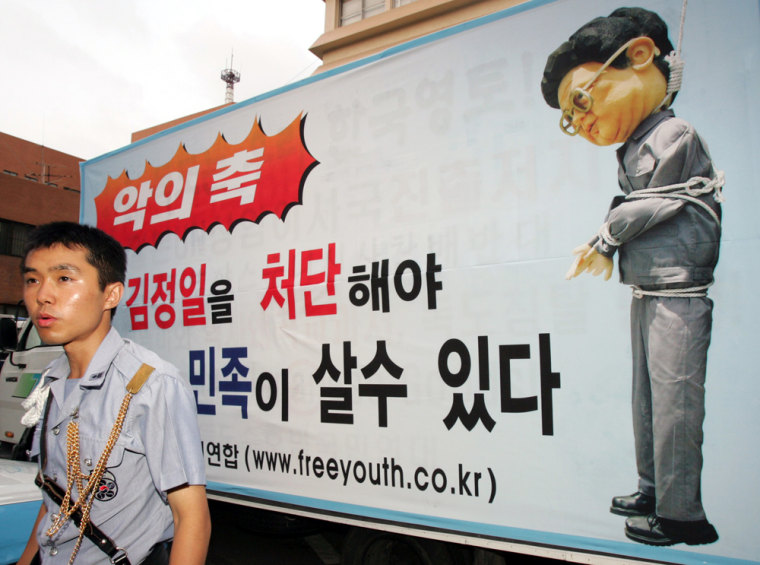North and South Korea opened high-level talks Wednesday amid renewed optimism over improved ties after the North's leader pledged reconciliation and a possible resumption of nuclear disarmament talks.
Although South Korea is expected to raise the international standoff over the North's nuclear weapons program, the North is likely to focus on aid for its impoverished economy and maintain its insistence that the nuclear issue can only be resolved with the United States.
The talks that run through Friday are aimed at improving ties and elaborating on agreements made during a surprise meeting in Pyongyang last week between North Korean leader Kim Jong Il and the South's top envoy to the North.
The North Korean delegation's visit got off to a rocky start Tuesday when protesters displayed banners condemning the communist country's leader.
As the North Korean delegates were being driven from the airport to the hotel where the talks were scheduled, vehicles adorned with posters calling for Kim to be punished and displaying him tied in ropes drove close to their motorcade, one of the protesters said at a police station where he was taken for questioning along with two other activists.
The North Koreans complained when confronted by the protesters, slightly delaying their arrival at the hotel, South Korea's YTN news channel reported.
In the North, Kim is the object of an official personality cult along with his father, founding President Kim Il Sung, and strict rules govern how their images are to be treated.
Contacts between the Koreas resumed last month in the North Korean town of Kaesong after being severed by the North for 10 months in anger over mass defections of its citizens to the South.
‘No longer extreme confrontation’
"There is no longer extreme confrontation between the South and the North as the world has feared," South Korean Unification Minister Chung Dong-young, head of Seoul's delegation, said at a dinner between the sides Tuesday evening, according to a statement from his ministry.
Kwon Ho Ung, a North Korean senior Cabinet counselor, echoed Chung's call for stronger ties between the Koreas.
Formal talks were scheduled from Wednesday through Friday.
After his meeting last week with Kim, Chung said the North Korean leader pledged to return as soon as July to the nuclear disarmament talks he has boycotted for a year and rejoin the Nuclear Nonproliferation Treaty if the standoff is resolved.
Family reunions for Koreans
The two sides also agreed to work together on a variety of bilateral issues — including family reunions between Koreans divided by the border — which were expected to be discussed at this week's talks in Seoul.
The two sides also agreed on the need to resume military talks. The Koreas remain technically at war since the Korean War ended in a 1953 cease-fire, not a peace treaty.
Another key area was Seoul's aid to the North. On Monday, South Korean officials said North Korea had requested 150,000 tons of fertilizer aid to help produce enough food to feed its impoverished people. The South already has shipped 200,000 tons of fertilizer this year.
Also Tuesday, South Korean Prime Minster Lee Hae-chan met with his Chinese counterpart in Beijing on Tuesday to try to secure China's help in bringing North Korea back to the disarmament talks.
In a meeting with Chinese Premier Wen Jiabao, Lee said a smooth resolution to the North Korean nuclear issue and the opening of rail ties between North and South Korea would benefit trade and personnel exchanges between Seoul and Beijing. He did not elaborate.
